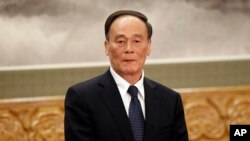China’s party-led, graft-busting body said it will soon begin inspections at 26 state-owned companies that are involved in a wide range of lucrative businesses from telecommunications to energy, a move analysts said could lead to the fall of more high-ranking officials.
The Communist Party’s Central Commission for Discipline Inspection said a wave of inspections will begin after the Lunar New Year Holiday, later this month.
Inspection teams will be divided into 13 groups, with each focusing on two state-owned enterprises in a wide range of sectors, although energy and power companies account for half of those targeted.
Backbone of enterprise
Economist Hu Xingdou said the targeted companies are the backbone of China’s state-owned enterprises and have a wealth of resources and capital.
There are also quite a few from the energy sector, or part of what is called the “oil faction,” he added.
Hu said the investigation into “all of these companies could lead to the fall of more tigers.” He said “that while it does not appear that the effort is entirely directed at a certain individual, such investigations into key sectors is unavoidable.”
China’s President Xi Jinping has characterized the party’s crackdown on corruption as an all-around effort that seeks to go after both "tigers" and "flies" or high- and low-ranking officials.
The party’s investigation into one of its biggest tigers yet, Zhou Yongkang, a former security chief and member of the party’s top decision making body, has exposed the Chinese public to the broad reach of graft and its links to business, gangs and natural resources.
Zhou was expelled from the party late last year and his case has been handed over to prosecutors. A trial is expected some time this year.
China’s leaders have called corruption the Communist Party’s biggest threat, in part because it undermines the public’s confidence. But the Communist Party remains the primary force involved in investigating its own corrupt officials and largely carries out the work in secret. That has raised concerns about the campaign’s independence.
According to the Xinhua news agency, some 70 senior officials at state-owned enterprises were taken down last year alone and more than 3,600 were punished. Last year, the government carried out inspections of 10 state-owned companies.
Rate of inspections
The Beijing News, a popular daily newspaper in the Chinese capital, suggests that at its current rate, the party could inspect more than 40 key state-owned companies this year.
Speaking to investigators on Wednesday, Wang Qishan, the head of the party’s graft-busting body, urged teams to carry out their work as if they were wielding the “sword of Damocles,” to hold it over the heads of those in power and keep them in a perpetual state of peril.
Wang said inspection teams will be zeroing in on problems at state-owned businesses such as abuse of power, misuse of funds and inappropriate links between family members and those heading up the companies.
State-owned enterprises dominate the Chinese economy but concerns about corruption have long been an issue.
Xi has called for increased scrutiny of the companies and their use of public funds.
Earlier this month, the party’s anti-corruption body released details of investigations into six state-owned companies. While details were scant, officials at telecommunications company China Unicom allegedly directed business to the families of those in charge and “traded sex for power.”
Inspectors also found major problems at coal and energy companies Huadian and Shenhua. Party investigators said Huadian allegedly transferred state assets to private companies.
'Actually bureaucracies'
Economist Hu said inspection teams need to keep up their pace to prevent more money from being be taken from public coffers and going into individual's pockets.
Hu said that although state-owned enterprises “seem to be companies, they are actually bureaucracies and the problem of buying up positions is rampant.”
He added that such a close “connections between business and bureaucracy breed serious corruption.”




